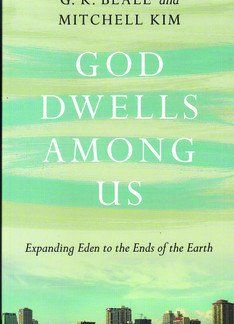For two reasons, I am writing this review in a worried frame of mind. First, I found it challenging to fully comprehend. There are some tightly argued theological points with plenty of follow-up references. Second, I found myself frequently disagreeing with the authors (worrying, because one is an eminent professor, while the other is an experienced pastor).
As I understand it, the message of this book is built on an interpretation of Genesis 1 and 2 which sees Eden as being a temple from which Adam and Eve were told by God to, ‘Be fruitful and increase in number, fill the earth and subdue it’ (Genesis 1:28).
This is interpreted as a command to expand Eden to all nations. Adam and Eve failed in this task, and the authors present parallels between Eden and future temples. These include those of the Old Testament as well as those mentioned in the New.
In the authors’ words, ‘The image of God’s glorious presence in a garden-like temple has formed a kind of “book end” structure around the entire canon of Scripture (Genesis 2 and Revelation 21:1–22:3), providing an interpretative key for understanding passages about the temple throughout Scripture. Another interpretative key has been the temple’s cosmic symbolism, which pointed to the goal of its own extension to become co-equal with the cosmos itself’ (p.156).
Having read with differing degrees of puzzlement, I got to chapter 10: ‘Why haven’t I seen this before?’, and was tempted to respond by saying, ‘Because it’s not really there!’ However, I concluded that could be unfair and I must admit I didn’t have the time to investigate all the book’s references.
Having said that, the motivation behind the book is sound: a heartfelt, prayerful desire to see God’s kingdom expand. The temple study clearly motivates the authors to greater work for God and his world mission. There are some excellent thoughts scattered throughout its pages, the authors using their approach to motivate us to greater prayer and study of God’s Word.
My problem is that I don’t think that the book adds anything new to the biblical imperative for mission and evangelism. To be frank, I’m not convinced by its basic assumption. I would hesitate to recommend this to any but those interested in novel ideas and interpretations.




